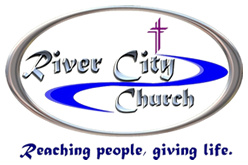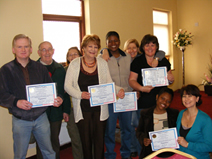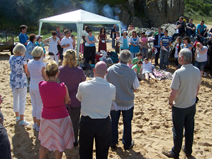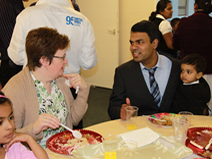Service Times
River City Church Sunday Worship
11:00 AM
School of Grace
Alternate Wednesdays 8pm
Midweek Home Groups
River City Church Sunday Worship
11:00 AM
School of Grace
Alternate Wednesdays 8pm
Midweek Home Groups

 Home groups are the name we give to small groups of believers and their friends/family who meet during the week in homes in various parts of the city to fellowship and worship together. They focus on people, rather than programs and allow for intimacy, accountability and are a place of prayer.
Home groups are the name we give to small groups of believers and their friends/family who meet during the week in homes in various parts of the city to fellowship and worship together. They focus on people, rather than programs and allow for intimacy, accountability and are a place of prayer.
They can run from several weeks to several years depending on the needs of the group. Some groups form around an Alpha course or similar teaching resource, others function as a fellowship and support group for believers with common needs or goals. Those leading the groups serve under the guidance of the local church leadership and endeavour to integrate their work with the life of the local church.
Consistently throughout scripture, the most effective model for discipleship is the family unit (Deut11.v19, Eph6.v4). The reason for this is that we cannot treat discipleship as a matter for the head only, a matter of knowledge to be learnt. We can’t claim to have learnt anything until we are able to apply it and the arena for application of our knowledge of Christ is in our relationships with each other.
 If the knowledge we have gained has not moved us into deeper relationships with His body, how can we claim it has brought us a deeper relationship with his Spirit? (1John4.v20)
If the knowledge we have gained has not moved us into deeper relationships with His body, how can we claim it has brought us a deeper relationship with his Spirit? (1John4.v20)
In short, shallow fellowship leads to shallow discipleship and the work of the Holy Spirit is hindered, for ‘deep cries out unto deep’. To receive all God has for us, we too must be prepared to go out into deeper waters. Each of us can only grow in faith through exercising our faith. We are all called to the work of making disciples and to the spiritual maturity such work requires. As an apostolic fellowship we believe that the five ministries of Ephesians 4 are called to equip the believers for the work of the ministry, not relegate them to the role of spectators.
 The fullness of God’s purpose for His Church is not just the addition of converts, but the multiplication of disciples. This was the vision of the great apostle Paul and he committed himself to a process of discipleship that Jesus taught the early disciples. That process has been summed up as;
The fullness of God’s purpose for His Church is not just the addition of converts, but the multiplication of disciples. This was the vision of the great apostle Paul and he committed himself to a process of discipleship that Jesus taught the early disciples. That process has been summed up as;
Bring them in.
Build them up.
Train them up.
Send them out.
The early Church knew how to multiply disciples because Jesus had taught them how. He took twelve disciples that they might be with Him, that He might send them (Mark3.v13-15)
Jesus made disciples by providing for them in that small group of twelve, two things that we struggle to provide through our traditional model of church.
There is nothing wrong with larger weekly church event meetings. The early church also met regularly together in the Temple courts. But for them that wasn’t the whole picture. They also met from house to house in small groups and such meetings provided a depth of fellowship and an opportunity to apply the truths they had been taught through practical service (Acts 2.v46,47). In those homes there was the communication and impartation of truths that the temple court events had laid the foundation for. What was taught was now caught!
 In other words such larger event meetings formed part of a process of discipleship that the home group meetings completed. The purpose of such large events was to equip the people for ministry, but the vast majority of such ministries would be exercised not at such large events but in the intimacy of homes throughout the city.
In other words such larger event meetings formed part of a process of discipleship that the home group meetings completed. The purpose of such large events was to equip the people for ministry, but the vast majority of such ministries would be exercised not at such large events but in the intimacy of homes throughout the city.
Discipleship is a process not an event.
The lasting impact of our local church on our community will not be measured by who came to our events, but who went out from them. Do we leave week after week as followers of one ministry, trained only to return as such, or are we leaving as disciples equipped for the work of the ministry from house to house?
One day we will be called to account for what we did with the truth we were given. Did we reach the generation and the community we were placed in? We believe to reach the community we need to reach beyond the church event and into the home. Take the home out of the Church and soon the Church is taken out of the home. We are being called into the harvest field and it is a field full of homes.
 The role of the apostolic, prophetic, pastoral, evangelistic and teaching ministries of the local church is to fulfil Christ’s prayer to ‘send workers out into the harvest field’ equipped for the work of the ministry (Eph.4.v11-16). Every harvester needs to leave equipped for the task, but the place their training will come to maturity can only be in the field.
The role of the apostolic, prophetic, pastoral, evangelistic and teaching ministries of the local church is to fulfil Christ’s prayer to ‘send workers out into the harvest field’ equipped for the work of the ministry (Eph.4.v11-16). Every harvester needs to leave equipped for the task, but the place their training will come to maturity can only be in the field.
To be found obedient to the Great Commission we will need to both “go out into the world” and “make disciples”. It seems we cannot separate one from another.
As a local church leadership we have committed ourselves to this purpose; to reach our community through making disciples. To be able to send disciples, we must be committed to the process of making them, the process of bringing them in, building them up, training them up and sending them out. The home group as a place where people can meet Christ, be built up in their faith, equipped to serve and released into ministry plays a vital role in the discipleship process.
Our goal as a local church leadership is to identify, nurture equip and release into service ministries of Christ into our community. We look to provide training, resources and opportunities to serve. The two pillars of this strategy are the multiplication of small groups in homes (home groups) and the provision of regular training seminars to identify, resource and develop ministries.